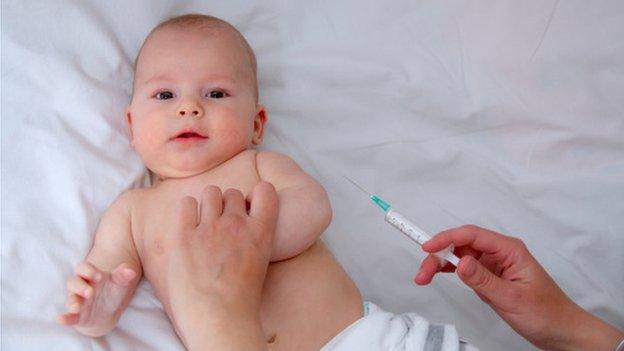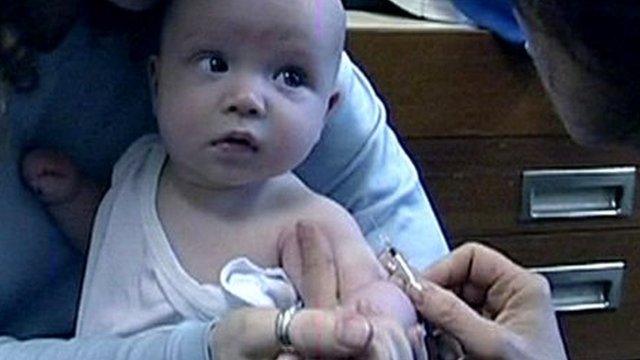UK experts back meningitis B jab
- Published

The vaccine will be given at two, four and 12 months
A vaccine that protects against a deadly form of meningitis is set to be introduced in the UK.
The Joint Committee on Vaccination and Immunisation (JCVI), which has recommended the move to the government, had said last year that the jab was not cost-effective.
Meningitis charities said more data had led to today's decision, and it was a "wonderful outcome".
About 1,760 people contract meningitis B each year and one in 10 dies.
Babies under one year are most at risk of meningitis B, and the cases peak at around five or six months of age.
The bacterial infection causes inflammations of the brain and spinal cord.
It leaves around a third with life-altering effects, such as brain damage or limb loss.
The JCVI said the vaccine was effective in preventing meningitis B and should be rolled out subject to it being made available by the manufacturer "at a cost effective price".
It has recommended the jab be added to the existing immunisation schedule, starting at two months of age.
Around 700,000 infants will be eligible for vaccination each year.
'First in the world'
There are vaccines against other forms of meningitis but the Bexsero jab, developed by Novartis, is the only one thought to protect against meningitis B.
Mother speaks after Tilly Lockey lost her hands and most of her toes to from the effects of the septicaemia
Tests have suggested the vaccine is effective against 73% of the different strains of the disease. It was licensed for use in Europe in January 2013.
The JCVI considered the introduction of the meningitis B vaccine last summer but in an interim judgement, it ruled it would not be cost-effective to introduce it.
At the time, campaigners called the decision a "severe blow" and urged the committee to look at the issue again.
More evidence has since been submitted, and the government will now begin negotiations with Novartis over the cost of the vaccine.
Novartis said it was "ready to supply" the vaccine as soon as the Department of Health had all the necessary processes in place,
Prof Andrew Pollard, chairman of the JCVI and professor of paediatric infection and immunity at the University of Oxford said: "MenB disproportionately affects babies and young children and can be devastating.
'Complex and brave decision'
"After very careful consideration, JCVI concluded that use of the new vaccine would reduce cases of meningococcal meningitis and septicaemia and lead to a reduction in deaths, limb amputations and brain injury caused by the disease.
"Today the JCVI published its recommendation to the UK health departments that if the new vaccine can be purchased at a low price and is therefore cost effective for the NHS, it should be used in the routine immunisation programme for babies in the UK to prevent disease.
"Routine use of the MenB vaccine is expected to make an important contribution to the health of our population."
The deputy chief medical officer, Prof John Watson, said: "We will now be working closely with Novartis in the coming months and if negotiations are successful, we hope to work with the other UK health departments to introduce a vaccine to prevent MenB as quickly as possible.
"This would make the UK the first country in the world to implement a nationwide vaccination programme."
Adam Finn, a vaccine expert and professor of paediatrics at the University of Bristol, said: "This was a complex, difficult and brave decision with far reaching consequences not only for the control of meningococcal disease but also for future vaccine development against severe but rare infections."
Christopher Head, chief executive of Meningitis Research Foundation said: "We are delighted that the JCVI have recommended vaccinating all babies against this most feared and deadly disease.
"It's a wonderful outcome which will save lives and spare countless families the trauma of seeing a loved one seriously disabled by the devastating after effects of MenB."
- Published18 February 2016

- Published24 July 2013

- Published24 July 2013
- Published22 January 2013

- Published17 November 2012
